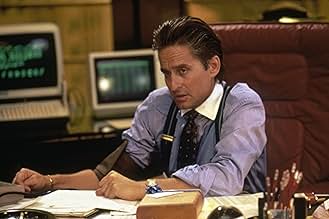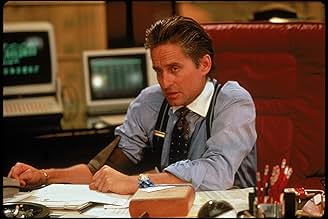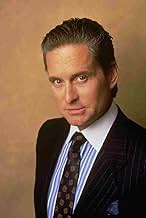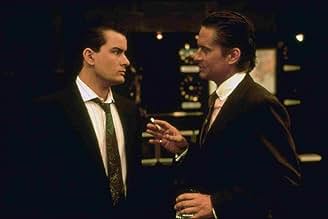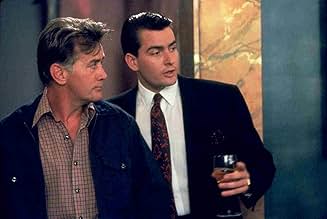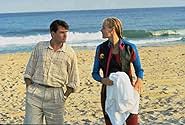Un joven e impaciente inversor está dispuesto a todo por llegar a la cima, incluso a vender información ilegal.Un joven e impaciente inversor está dispuesto a todo por llegar a la cima, incluso a vender información ilegal.Un joven e impaciente inversor está dispuesto a todo por llegar a la cima, incluso a vender información ilegal.
- Dirección
- Guionistas
- Elenco
- Ganó 1 premio Óscar
- 9 premios ganados y 4 nominaciones en total
- Chuckie
- (as Chuck Pfeifer)
- Dirección
- Guionistas
- Todo el elenco y el equipo
- Producción, taquilla y más en IMDbPro
Opiniones destacadas
The film follows a low level day trader (Charlie Sheen) who strives to become a very powerful figure on Wall Street like his idol Gordon Geckko (Michael Douglas). To justify his rise to power, he uses his father (Martin Sheen) knowledge of the flight industry for his own personnel gains. He wants to get his foot into the door of the oily Geckko. Will he sell his soul for a quick buck? How far and fast will this rising star soar? To find these answers check out Wall Street.
This film was made immediately after Platoon. Stone made it clear that he wasn't going to let an Oscar winning malaise effect him. He explores the two fathers theme that he used in Platton and once again makes it work. A highly underrated film that has sadly been neglected by the mainstream audience. What makes it even sadder is the fact that it still applies today.
Highly recommended.
The characters are interesting and richly developed, with the exception of Darryl Hannah's underwritten character. I can see why she didn't like playing that role. Douglas is always a joy to watch, and makes a suave yet slimy villain. I wouldn't necessarily say he deserved an Oscar, but he did a fine job nonetheless. So did Charlie Sheen, who is actually the star of the film despite the fact that most people remember "Wall Street" for Douglas as Gordon Gecko. Sheen gives a fine multi-dimensional performance. I love the scenes between him and his father Martin Sheen, who plays his father in the film. Oliver Stone made a great choice casting the father-and-son team, since the tension in their scenes feels very authentic.
There are some predictable plot turns and character arcs, but altogether Stone keeps the excitement going. I like how the climactic scene between Douglas and Sheen is shot without cuts, with the camera moving from person to person, keeping the tension going. If I knew at least an inkling about the stock market, I wouldn't be completely lost during certain scenes, but what can you do? I still think it's a fine film with solid performances.
My score: 7 (out of 10)
There are two schools of thought when it comes to money. Some economists argue money is an expanding resource, and prosperity a rising tide that lifts all boats. For Gekko, the truth is simpler and more brutal: The rich get richer off the backs of everyone else. "Money itself isn't lost or made, it's simply transferred," he tells his young protégé Bud Fox (Charlie Sheen).
No question writer-director Oliver Stone feels the same way, as he presents this tale of wealth acquisition at its very apex, lower Manhattan circa 1985. In practically every frame showcasing the opulent world Gekko travels can be glimpsed beggars, fishermen, window washers, people who never will have access to the white-collar lifestyles their lowly status perversely enables for others.
For some, this zero-sum take of America clouds their enjoyment of "Wall Street" the movie. It shouldn't. You don't have to buy Shakespeare's version of history in "Richard III" to enjoy the morally bankrupt character at its center, and you don't need to adopt Stone's philosophy to enjoy Gekko.
In fact Stone's attitude about the Street, presented here as a kind of Hogarth caricature, helps make the film so entertaining. He captures the scenes of floor trading and calls and puts in journalistic detail, but leaves room for the human equation. And he has fun, a lot of fun, especially with Gekko, a character who makes you laugh with his pithy comments even as he sets about using poor Fox as a human ashtray.
On an upcoming charity event for the Bronx Zoo: "That's the thing about WASPs. They hate people, but they love animals." On a rival: "If he was in the funeral business, no one would ever die!" To Fox: "You had what it took to get into my office, sport, the question is do you have what it takes to stay."
Fox wants to stay, and allows no SEC regulation to block his wayward path. Stone's father was a stockbroker, and so the director takes special care to show us that all Wall Streeters aren't bad. There's Hal Holbrook, almost too saintly and somewhat detached from day-to-day business of his brokerage house to the point he seems a slumming B-school don. John C. McGinley delivers a standout performance as a vulgar, greedy friend of Fox's who we nevertheless find ourselves sympathetic to, especially as Fox ditches him for Gekko.
But of course it's really Gekko's world, as we watch him at his desk, punching telephone-line buttons and encouraging subordinates to "rip their throats out," checking his blood pressure with one hand while smoking a cigarette in the other. His centerpiece moment, his speech to the stockholders at Teldar Paper, is a compelling soliloquy not because it showcases his brutality but because it allows him a chance to explain his philosophy in a way that sounds logical, even honorable, until you think through the implications. That's Stone's screen writing at its best.
Sheen is also masterful in his role, playing the naive waif who wants to swim with the sharks and thus giving Douglas daylight to run. Too bad there's a tacked-on romance that never really works, in part because the character of Darien Taylor is not well developed, in part because Darryl Hannah hadn't yet met Quentin Tarantino. The ending is a bit too neat, and loses the subtlety that makes the rest of the film so good.
But the heck with subtlety when you have Gordon Gekko. Douglas is the reason for watching "Wall Street," and a terrific one. Just watch the way he looks at Bud, eyebrows raised to hold a pregnant silence, or enjoys the discomfort of his arbitrager-rival Sir Larry (a solid Terence Stamp). Stone knew what he had here, and makes the most of it. As a twisted morality tale, "Wall Street" is a thrilling, scenic ride down a dark and dangerous road.
Gekko is a villain and an outlaw, but mostly he comes across to viewers as a worldly tough guy, a charming bully with a glamorous lifestyle. We see his high-class mega-office, his plush home and chic wife, his expensive paintings, his rapid-fire commands to his robotic lieutenants, his snazzy clothes and "in vogue" friends. Here and there we see his frustrations, but that only accentuates his toughness. We do not see him suffer, nor do we see the consequences of his selfish, Machiavellian behavior.
As a result, to viewers, especially to those youthful, bright, materialistic Americans with a smug, "can do" attitude, and disdain for ethics, Gekko is, unfortunately, someone to admire, a Wall Street role model.
¿Sabías que…?
- TriviaIn the scene in which Bud Fox brings a birthday gift to Gekko's office, Gordon's secretary says 'Five minutes' in order to keep the unplanned meeting between Gekko and Fox as brief as possible. There are exactly 5 minutes in the movie from this moment to the moment in which Bud leaves the office.
- ErroresAt the beginning of the movie, Bud Fox and Marvin say Gordon Gekko was shorting NASA stock right after the Challenger explosion. The scene is set in 1985, but the Space Shuttle Challenger exploded January 28, 1986.
- Citas
Gordon Gekko: The richest one percent of this country owns half our country's wealth, five trillion dollars. One third of that comes from hard work, two thirds comes from inheritance, interest on interest accumulating to widows and idiot sons and what I do, stock and real estate speculation. It's bullshit. You got ninety percent of the American public out there with little or no net worth. I create nothing. I own. We make the rules, pal. The news, war, peace, famine, upheaval, the price per paper clip. We pick that rabbit out of the hat while everybody sits out there wondering how the hell we did it. Now you're not naive enough to think we're living in a democracy, are you buddy? It's the free market. And you're a part of it. You've got that killer instinct. Stick around pal, I've still got a lot to teach you.
- Créditos curiososBuilding illustrations are shown during entire end credits
- Versiones alternativasIn the VHS release, instead of the correct 1981-1994 20th Century Fox logo, the 1953-1981 logo is used.
- Bandas sonorasFly Me to the Moon
Words and Music by Bart Howard (ASCAP)
Published by The Hampshire House Publishing Corp. (ASCAP)
Performed by Frank Sinatra
Courtesy of Reprise Records
By Arrangement with Warner Special Products
Arrangement by Quincy Jones (uncredited)
Selecciones populares
Detalles
- Fecha de lanzamiento
- País de origen
- Sitio oficial
- Idioma
- También se conoce como
- Wall Street
- Locaciones de filmación
- 60 W. 75th St, Nueva York, Nueva York, Estados Unidos(Bud's first apartment building)
- Productoras
- Ver más créditos de la compañía en IMDbPro
Taquilla
- Presupuesto
- USD 15,000,000 (estimado)
- Total en EE. UU. y Canadá
- USD 43,848,069
- Fin de semana de estreno en EE. UU. y Canadá
- USD 4,104,611
- 13 dic 1987
- Total a nivel mundial
- USD 43,848,069
- Tiempo de ejecución2 horas 6 minutos
- Color
- Mezcla de sonido
- Relación de aspecto
- 1.85 : 1
Contribuir a esta página





